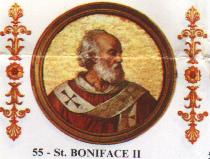
Boniface II A Roman of Germanic descent, Pope Boniface II gained infamy for his suggestion that a pope appoint his own successor. The favorite of Felix III/IV, he was not elected to the papacy immediately after Felix's death in 530. When Dioscorus died twenty-two days after his election, Boniface was voted into the papal office. In 531, Boniface called a council to confirm the pope's right to choose his own successor and to confirm Vigilius as his successor. A second council later that year overruled the previous council's decisions. When Boniface died in 532, he was buried in St. Peter's; John II succeeded him.
pope and bishop of Rome from 530 to 532 "Boniface II" redirects here. For other uses, see Boniface II (disambiguation).Pope Boniface II (Latin: Bonifatius II; died 17 October 532) was the first Germanic bishop of Rome. He ruled the Holy See from 22 September 530 until his death. He was born an Ostrogoth.
Boniface was chosen by his predecessor, Felix IV, who had been a strong adherent of the Arian king, and was never elected. He was later elected, largely due to the influence of the Gothic king Athalaric. For a time, Boniface served as pope in competition with Dioscorus, who had been elected by most of the priests of Rome. Boniface and Dioscorus were both consecrated in Rome on 22 September 530, but Dioscurus died only twenty-two days later.
Boniface II's most notable act was confirming the decisions of the Council of Orange, teaching that grace is always necessary to obtain salvation. Boniface was buried in St. Peter's on 17 October 532.

